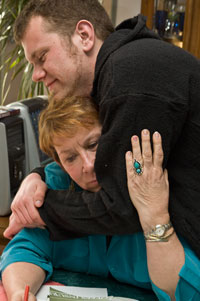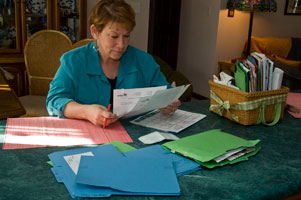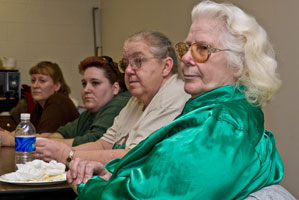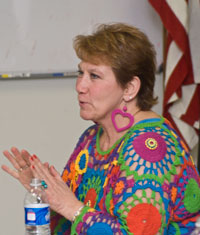|
May/June 2008 Issue Dealing With Cancer Debt
“Cancer is not just physically disruptive; it is economically disruptive [as] the comfort level in the house changes for everybody,” Craddock says. “Your income is cut in half because often you cannot work. With the half you have left, you have to worry about how to buy drugs for treatment. In addition, there are all the issues of dealing with family and your own feelings about having a parent or partner with cancer.” People worry about how they will pay their mortgage and not lose their house. Do the credit cards have a clause that covers catastrophic illness? Should we refinance? When we buy a house or apply for a credit card, we are not thinking about the cancer diagnosis that may be months away. We all know someone with cancer, and why shouldn’t it be us? “What I learn every day is that you never think it is you, but it is,” says Craddock. Along with the shock and numbness comes a loss of dreams, assaults on body image, and intimacy issues.
“I work at the hospital and make an OK income but on my prescription coverage, if I had to go on medication for stomach cancer, I could maybe afford a couple of months on my own and then what happens?” she continues. “You completely deplete your savings, investment funds, and IRAs. You drain that out. A lot of people are living off their credit cards. You don’t have the money, but you need groceries, you need to pay your bills, so you end up putting it all on your credit card. We have patients dealing with bankruptcy issues because of what happened. When you sit with a patient and go over their finances, there are really no options for them.”
“That breast had to go. I had the other one removed also. I had that done and thought that had to be the worst of it. That was followed by radiation and chemotherapy. Bald is not so bad, I thought, but what made it such an arduous journey was the left side had been radiated, therefore it would not heal. I went around the next two years with a hole in my chest,” she explains. As a consequence of this hole, Mascioli could not bathe or take a shower. Fifty hyperbaric treatments would not close the wound. She had to wear a wound VAC and go to the hospital with every new infection. Cumbersome and noisy from the ticking sound it made as it sucked the wound dry, it caused her to give up working for three months. It was a chore to leave the house with the machine. She was not supposed to drive but, as a single parent, what could she do? Eventually, she underwent 11 surgeries to fill the hole.
Mascioli says her house is the only thing she has of value, but she is only three payments away from losing it. She cannot even afford the $23 to buy a pair of false breasts at Wal-Mart to cosmetically substitute for the reconstructed breasts the insurance will not pay for. Despite these hardships, she is surprisingly upbeat and believes the cancer has been a great teacher for her and her sons. “I think that having to take care of their mother, having to grow up quickly, and having to assume a lot of responsibility that young teenage boys don’t have to assume, they will make much better husbands and good fathers,” Mascioli says. — Neal A. Newfield, PhD, ACSW, is an associate professor of social work and a documentary photographer with the division of social work at West Virginia University. * Oncology social worker with certification. Information on oncology certification through the Board of Oncology Social Work Certification (BOSWC) and membership in the Association of Oncology Social Workers (AOSW) can be found at: www.aosw.org/html/conf-other.php. The BOSWC and AOSW are separate organizations. |

 A cancer diagnosis is like a stone thrown into the water. It ripples out from the people who are diagnosed to their spouse or partner and then to the children, according to Jennifer Craddock, MSW, LCSW, OSWC*, of the Mary Babb Randolph Cancer Center in Morgantown, WV. The cancer center engages in an estimated 20,000 patient visits per year and sees approximately 1,000 new patients per month. For the people experiencing these “ripples,” it may feel more like a tsunami.
A cancer diagnosis is like a stone thrown into the water. It ripples out from the people who are diagnosed to their spouse or partner and then to the children, according to Jennifer Craddock, MSW, LCSW, OSWC*, of the Mary Babb Randolph Cancer Center in Morgantown, WV. The cancer center engages in an estimated 20,000 patient visits per year and sees approximately 1,000 new patients per month. For the people experiencing these “ripples,” it may feel more like a tsunami. Cancer not only attacks your body but also your class status, according to Patricia Policicchio, MSW, LGSW, OSWC. “You move suddenly from a middle-income home to a lower income home. Most insurance is only going to cover 80% of costs. We are now prescribing designer drugs. You don’t have to come here every day or every other week to get your chemotherapy through an IV because it is in a pill. But the down side is we are not using our major medical; we are using prescription coverage. People have 20% to 30% copays, and these medicines can cost $10,000 a month in the case of leukemia or, for solid tumors, it can easily go up to $70,000.
Cancer not only attacks your body but also your class status, according to Patricia Policicchio, MSW, LGSW, OSWC. “You move suddenly from a middle-income home to a lower income home. Most insurance is only going to cover 80% of costs. We are now prescribing designer drugs. You don’t have to come here every day or every other week to get your chemotherapy through an IV because it is in a pill. But the down side is we are not using our major medical; we are using prescription coverage. People have 20% to 30% copays, and these medicines can cost $10,000 a month in the case of leukemia or, for solid tumors, it can easily go up to $70,000.  In the fall of 2003, Christine Mascioli, a teacher and divorced mother of three teenage boys, was diagnosed with stage 1 breast cancer. A lumpectomy and radiation therapy left her feeling lucky and cancer free—or so she thought. The next year, a serious cancer was discovered in her other breast.
In the fall of 2003, Christine Mascioli, a teacher and divorced mother of three teenage boys, was diagnosed with stage 1 breast cancer. A lumpectomy and radiation therapy left her feeling lucky and cancer free—or so she thought. The next year, a serious cancer was discovered in her other breast.  Mascioli describes her present situation: “I am being sued by West Virginia University [WVU] Hospital because I am not paying my bills fast enough. I am a West Virginia schoolteacher; there is only so much money coming in. I pay as fast as I can pay. I work three jobs now. I teach all day, tutor after school, and work for the security company that does all the WVU basketball and football games for $7.50 an hour. I have received wonderful medical care, but the doctors clamor for their money and they want it now. A couple of years ago, I bought the boys’ winter coats at the Goodwill because I couldn’t pay a collection agency, pay for my Arimidex [necessary to prevent relapse], pay the wound VAC company, the hyperbaric bill, or buy my children winter coats. I will pay bills until I die. I will never be out of debt.”
Mascioli describes her present situation: “I am being sued by West Virginia University [WVU] Hospital because I am not paying my bills fast enough. I am a West Virginia schoolteacher; there is only so much money coming in. I pay as fast as I can pay. I work three jobs now. I teach all day, tutor after school, and work for the security company that does all the WVU basketball and football games for $7.50 an hour. I have received wonderful medical care, but the doctors clamor for their money and they want it now. A couple of years ago, I bought the boys’ winter coats at the Goodwill because I couldn’t pay a collection agency, pay for my Arimidex [necessary to prevent relapse], pay the wound VAC company, the hyperbaric bill, or buy my children winter coats. I will pay bills until I die. I will never be out of debt.” 